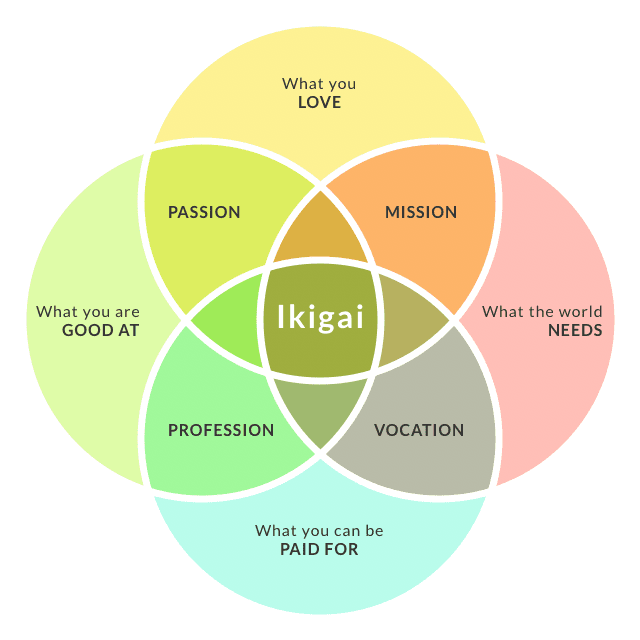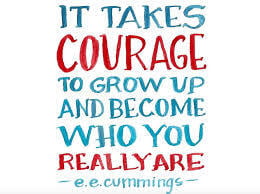Understanding Ourselves to Find Purpose
What It Means To Have Purpose
For as long as I can remember, I have always been working towards a goal or a dream. As soon as I managed to accomplish one of my objectives, a desire to target the next big thing would start forming. The process of working towards these goals has been a large part of what I feel has given my life meaning and purpose.
Early on, I attained my dreams through trial and error. Fortitude was one of my strong points, so even when the path wasn’t easy I prided myself on never giving up. Yet, as I got older and I gained wisdom I realised something: the forward motion I felt while working towards a goal was really only part of the deeper experience. There was a bigger question looming beneath it all.
“The real test of knowledge is not whether it is true, but whether it empowers us.”
Yuval Noah Harari, “Sapiens”
Why Does Having Purpose Even Matter?
This primal question had no immediate answer. Other animals are content finding purpose by simply surviving. Humans seem to need more than that. But why?
I began by asking myself the following questions:
- Why was I motivated to wake up every day?
- Are we rational beings?
- Is searching for purpose rational?
- Can the lack of purpose be what damages us the most?
Some of these questions were easy to answer. I knew what motivated me was to inspire and share with others in order to create a better world. In Part 2 of this essay, I will discuss the concrete ways I go about doing just that. However, before I could continue on my quest, I needed to know what made the desire to succeed at my self-imposed goals burn so bright? And, perhaps even more importantly, what might be holding me back?

The Rationale for Being Irrational
Let me be blunt and provocative. For starters, humans are, in essence, irrational beings living in non-existent societies. By this, I mean that societies have been created by us. They are essentially figments of our imaginations. Certain things that we know to be true, like the fact that France borders on Switzerland, are actually human creations. Animal and plant life don’t see any difference between the two countries on either side of the Alps, yet, we insist on creating invisible borders. Humans are masters at creating stories and then deeply believing in them to the point that an alternate reality can no longer exist.
Storytelling is what humans do best. We’ve created stories to explain and organise what we perceive to be real for millennia. It has allowed us to create complex and vast ever-changing systems that bind us together so that we can easily dominate other species. Without such a remarkable capacity to create fiction that makes us believe in Government, Money and Religion, we humans could not be at the top of the food chain. The ever changing stories we build over and over are the actual cement of our societies and cultures.
Yet, despite our deep-seated beliefs in our stories, there is also something within us that thrives on paradox. To put it more clearly, can we all agree that when we say/think something, we often end up doing exactly the opposite? Is this as true for you as it is for me? Do you think that accepting such behavioural patterns as “normal” is rational?
If tobacco has repeatedly been proven to result in cancer, why do we continue to sell it? To smoke it? If healthy food is essential to a healthy life, why do we continue to make the decision to eat so poorly? We can all agree that if we continue to abuse our plastic consumption that we put ourselves, our children and all life on Earth at risk of extinction. Yet, how many of us have managed to decrease our plastic use? … and the list goes on.

At heart, we are all irrational beings and this implies that humans have an incredible capacity to find comfort in contradictions. It is important to realise that our basic need to seek meaning in life is also irrational. Yet, that doesn’t make it any less essential.
What Holds Us Back From Our Goals?
I hope that I’ve demonstrated two important things by now: our irrational capacity goes well beyond beliefs, and created fictions are a powerful force. Yet, what does irrationality have to do with needing to find purpose?
Our quests for purpose are simply another part of our personal storytelling. They are built upon generations of fabricated knowledge. So if purpose was invented and therefore irrational can’t it also be limitless? In light of this, why can’t each of us create a beautiful story that resembles us, so that we can each strive in our imaginary world, and be exactly as successful as we choose to be?
Finding Your Purpose
Anyone who has made it this far into this article might find some inspiration in the beautiful Mandy Hale quote that states that...
“Sometimes all we can do is to embrace the uncertainty. Focus on the wait, enjoy the beauty of becoming. For when nothing is certain, anything is possible.”
Knowing that your options are truly as broad as your imagination can be liberating but it can also be overwhelming. Initially, I too struggled to have a clear view of my ultimate purpose until, while researching, I stumbled on an ancient Japanese concept called ikigai.
Ikigai literally means “A Reason for Being”. Not only does this concept help define who a person truly is, it also creates a framework for what that person should strive to become. Joseph Campbell poignantly explained this concept when he wrote...
“People say that we’re searching for the meaning of life. I don’t think that is it at all. I think that what we are seeking is an experience of being alive.”
Ikigai is a simple, practical and effective way for anyone looking to have a deeper and more meaningful experience more in their lives. Ready to begin?

Take a look at the four central questions featured in this conceptual framework and address each one with a verb, name or concept that relates to how you see yourself. List as many elements you hold for each question. If you use the same words in several questions as in the below sample, this is fine. Be honest with yourself, and take your time, do it over and over. It may take weeks to nail down the true essence of each personal category.
Once you’ve completed your list, review the chosen words. Now it’s time to be truthful—you’ll grade yourself on how you truly excel at each concept. To do this, rate yourself on how proficient you think you are compared with a random group of 100 people. Take a look at one of my client’s sample tests. The word “creativity” appears repeatedly under each question category. He gave himself a score of 100%, meaning he felt strongly that he was a master at being creative. Finally, classify each word by order of importance. If a word scores below 80-85%, you may choose to remove it.
As you work, you may realise that some verbs are similar and can be grouped. For example, negotiating and persuading have a close enough meaning that they can be summarised by one word such as “influencing”. If you’re still unsure about the right verbs/skills/capacities and its ratings, ask your partner, your mother or someone else who knows you very well, and validate your findings together.
DEFINE YOUR IKIGAI
A Japanese term for "Reason for Being."
The word ‘Ikigai’ usually refers to the source of value in one's life or the things that make one's life worthwhile.
| WHAT I CAN BE PAID FOR | WHAT I AM GOOD AT | WHAT I LOVE TO DO | WHAT THE WORLD NEEDS | PERFORMANCE |
| Creativity | Creativity | Creativity | Creativity | 100% |
| Laughing | Laughing | Laughing | Laughing | 100% |
| Breathing | Breathing | Breathing | Breathing | 95% |
| Talking | Talking | Talking | Talking | 95% |
| Public Speaking | Public Speaking | Public Speaking | Public Speaking | 95% |
| Persuading | Persuading | Persuading | Persuading | 95% |
| Questioning | Questioning | Questioning | Questioning | 90% |
| Exercising | Exercising | Exercising | Exercising | 90% |
| Resolving | Resolving | Resolving | Resolving | 90% |
| Conceptualizing | Conceptualizing | Conceptualizing | Conceptualizing | 90% |
| IKIGAI KEYWORD(S) | TO INSPIRE |
DEFINE YOUR mission
IT offers the opportunity to establish what's important to you.
It can also help guide you towards a decision in a particular job, company, or career field.
| WHAT I LOVE TO DO | WHAT THE WORLDS NEED | PERFORMANCE |
| SPONTANEITY | SPONTANEITY | 100% |
| INTROSPECTION | INTROSPECTION | 95% |
| PHILOSOPHY | PHILOSOPHY | 95% |
| PSYCHOLOGY | PSYCHOLOGY | 95% |
| SINCERITY | SINCERITY | 95% |
| MISSION KEYWORD(S) | TO GROW |
DEFINE YOUR PASSION
Represents a strong or extravagant fondness, enthusiasm or desire to do something.
| WHAT I AM GOOD AT | WHAT I LOVE TO DO | PERFORMANCE |
| IMPROVISATION | IMPROVISATION | 100% |
| WATERSKIING | WATERSKIING | 100% |
| DRIVING | DRIVING | 90% |
| SKIING | SKIING | 90% |
| PASSION KEYWORD(S) | TO FLOW |
DEFINE YOUR PROFESSION
This is an occupation, practice, or vocation requiring mastery of a complex set of information
and skills through formal education and/or practical experience.
| WHAT I CAN BE PAID FOR | WHAT I AM GOOD AT | PERFORMANCE |
| PERSUADING | PERSUADING | 100% |
| INTERVIEWING | INTERVIEWING | 95% |
| MARKETING | MARKETING | 90% |
| MANAGING | MANAGING | 80% |
| PROFFESSION KEYWORD(S) | TO LEAD |
DEFINE YOUR VOCATION
What am I destined to become? A vocation is not something that you can switch like a profession or a career.
| WHAT I AM GOOD AT | WHAT THE WORLDS NEED | PERFORMANCE |
| SPONTANEITY | SPONTANEITY | 100% |
| ADAPTATION | ADAPTATION | 95% |
| STRAIGHT FORWARDNESS | STRAIGHT FORWARDNESS | 90% |
| HEALTHY LIFESTYLE | HEALTHY LIFESTYLE | 90% |
| VOCATION KEYWORD(S) | TO BE CONCIOUS |
Your next step is to search for one word that can effectively summarise the other verbs, names or concepts that have been identified within each section. This word should be written on the right side of the table and should truly describe the essence of who you are.
For example, “To Flow” is my client’s Passion. He arrived at this word because of his skills of waterskiing, skiing, driving and improvisation. All of these talents require the ability to focus and react promptly as well as effective navigation capacities within the flux of the environment, whether that be flying through the air above a lake or sailing his way through a speech in front of a room full of business colleagues. He felt that the epitome of those skills was his ability to effectively “flow” through any situation. This is the same process of self reflection that he went through for each section.
Once completed, you’ll know what words are the most important to you. These words, though extremely specific, will also be general enough to cover a wide variety of activities in which you can choose to partake. Your next step is to identify which activities will serve you best within this framework.
My client discovered throughout the process that his Ikigai is “To Inspire”. Striving to inspire others requires “Consciousness” of thoughts, words and actions, which describes his Vocation. In order to find new ways to inspire others, he also needs to constantly continue to learn and to “Grow”, which is his Mission. As a business owner, “Leading” is a necessity. It is also an essential part of his character, making it his Vocation. Last but not least is his Passion for “Flow”. He is constantly seeking new ways to maximise his creative flow, in order to remain as long as possible in his most productive state. Reflecting in depth on these keywords helped him to narrow down his career paths to being a Mentor, Coach, Healer or Entertainer.

Image source: vpr.org
For me, my Ikigai has become my compass. The gained knowledge of realising that my possibilities are limitless in the human construct of our society, along with my deep beliefs in creating my life story with this guidance have provided deep and long lasting fulfilment.
Discovering your own IKIGAI, Passion, Vocation, Mission and Profession is not as easy as it may seem. It may be more evident for some people than others. It often relates to each person’s capacities to reflect inwardly. If you face difficulties, ask for the support of a wise analytical mind and/or a wordsmith. Believe me, with sustained concentration and sufficient time, you’ll find it too, and once you do, you’ll be able to guide your storytelling path towards true meaning. Remember, your purpose in life may evolve over time, thus it is important to continue to re-examine your Ikigai every few years or so.
The next time you find yourself needing to make an important decision concerning your life or career, ask yourself if doing so will serve your Ikigai? This will guide you, and give you strength to pursue your goals with a newly gained sense of purpose. Afterall, when you are living a passion-filled life you are living on purpose, and that is the purpose of life.


